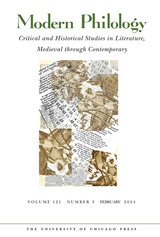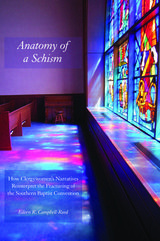
From 1979 to 2000, the Southern Baptist Convention (SBC) was mired in conflict, with the biblicist and autonomist parties fighting openly for control. This highly polarizing struggle ended in a schism that created major changes within the SBC and also resulted in the formation of several new Baptist groups. Discussions of the schism, academic and otherwise, generally ignore the church’s clergywomen for the roles they played and the contributions they made to the fracturing of the largest Protestant group in the United States. Ordained women are typically treated as a contentious issue between the parties. Only recently are scholars beginning to take seriously these women’s contributions and interpretations as active participants in the struggle.
Anatomy of a Schism is the first book on the Southern Baptist split to place ordained women’s narratives at the center of interpretation. Author Eileen Campbell-Reed brings her unique perspective as a pastoral theologian in conducting qualitative interviews with five Baptist clergywomen and allowing their narratives to focus attention on both psychological and theological issues of the split. The stories she uncovers offer a compelling new structure for understanding the path of Southern Baptists at the close of the twentieth century. The narratives of Anna, Martha, Joanna, Rebecca, and Chloe reframe the story of Southern Baptists and reinterpret the rupture and realignment in broad and significant ways. Together they offer an understanding of the schism from three interdisciplinary perspectives—gendered, psychological, and theological—not previously available together. In conversation with other historical events and documents, the women’s narratives collaborate to provide specific perspectives with universal implications for understanding changes in Baptist life over the last four decades.
The schism’s outcomes held profound consequences for Baptist individuals and communities. Anatomy of Schism is an illuminating ethnographic and qualitative study sure to be indispensable to scholars of theology, history, and women’s studies alike.
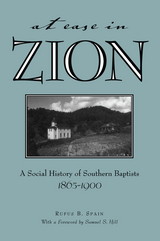
First published in 1967, Rufus Spain’s thorough investigation into Southern Baptist attitudes set the stage for research on religion in the American South. In At Ease in Zion, Spain questions the titular “ease” with society that Southern Baptists seemed to maintain following the Civil War. His analysis of denominational newspapers, as well as reports from the Southern Baptist Convention and state conventions, paint a compelling picture of the subjects’ complacency with their social existence, even as they criticized personal and recreational ethics.
While the South faced significant social, economic, and political changes after the Civil War, religion remained the primary moral influence. As the Southern Baptist denomination made up a significant majority of the population at that time, its leaders and attitudes had a clear and undeniable impact on social norms. Rufus Spain was one of the first writers to actively demonstrate the relationship between Southern religion and Southern society, and his work displays meticulous attention to the ways in which we are affected by complacency. He asserts that Southern Baptists viewed the American South as a version of God’s ideal society; any issues they wished to address were caused by individuals (such as those who did not conform to societal norms) or external attitudes (such as those in differing religions or regions).
At Ease in Zion is a critical part of the scholarly discussion on religion in society. Spain’s research offers a bold analysis of the American South and its citizens during one of the most tumultuous times in its history while providing a basis for arguments on “social Christianity” and its ever-shifting role in the world.
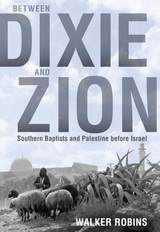
One week after the establishment of the State of Israel in 1948, delegates to the Southern Baptist Convention (SBC) repeatedly and overwhelmingly voted down resolutions congratulating fellow Southern Baptist Harry Truman on his role in Israel’s creation. From today’s perspective, this seems like a shocking result. After all, Christians—particularly the white evangelical Protestants who populate the SBC—are now the largest pro-Israel constituency in the United States. How could conservative evangelicals have been so hesitant in celebrating Israel’s birth in 1948? How did they then come to be so supportive?
Between Dixie and Zion: Southern Baptists and Palestine before Israel addresses these issues by exploring how Southern Baptists engaged what was called the “Palestine question”: whether Jews or Arabs would, or should, control the Holy Land after World War I. Walker Robins argues that, in the decades leading up to the creation of Israel, most Southern Baptists did not directly engage the Palestine question politically. Rather, they engaged it indirectly through a variety of encounters with the land, the peoples, and the politics of Palestine. Among the instrumental figures featured by Robins are tourists, foreign missionaries, Arab pastors, converts from Judaism, biblical interpreters, fundamentalist rebels, editorialists, and, of course, even a president. While all revered Palestine as the Holy Land, each approached and encountered the region according to their own priorities.
Nevertheless, Robins shows that Baptists consistently looked at the region through an Orientalist framework, broadly associating the Zionist movement with Western civilization, modernity, and progress over and against the Arabs, whom they viewed as uncivilized, premodern, and backward. He argues that such impressions were not idle—they suggested that the Zionists were bringing to fruition Baptists’ long-expressed hopes that Israel would regain the prosperity it had held in the biblical era, the Holy Land would one day be revived, and biblical prophecies preceding the return of Christ would be fulfilled.
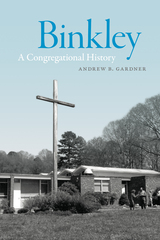
Established in 1958 in the college town of Chapel Hill, North Carolina, the Olin T. Binkley Memorial Baptist Church immediately sought to establish a welcoming religious community—focusing initially on bringing in both Black and White congregants and, as ideas about inclusivity developed, on accepting all people, regardless of identity. By naming itself for a theologically progressive preacher and professor, the fledgling church signaled a perspective unfamiliar to Baptists in the South, which gave the church a radical edge. The church’s first pastor, Robert Seymour, also possessed a progressive vision that resonated with his congregants and pushed them to commit to justice and equality. Soon after its founding, the church strived to challenge inequality in segregated Chapel Hill. Although it remained predominantly White well into the twenty-first century, Binkley evolved to become increasingly aware of issues of gender equality, equity, LGBTQ inclusion, and climate justice. Addressing these issues was Binkley’s way of building God’s kingdom on earth as it is in heaven.
Binkley: A Congregational History tells the story of a single church with a complicated past, demonstrating that, while liberal in heritage, it operated with an unconsciously White, heteronormative worldview that slowly evolved into a distinct expression of faith. The author also draws on scholarship within the broader field of American religious history to position Binkley—with all its complexities, conflicts, and nuances—within the broader context of twentieth-century liberal Protestantism. Perhaps most importantly, Gardner tells the story of a place animated by a vision of Christianity that is often overlooked or drowned out by larger and louder Christian groups. He compellingly shows how this progressive vision of Christianity has shaped Binkley’s commitment to its community and beyond.
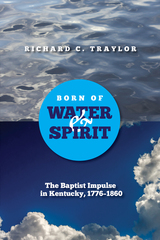
rate, rising from fifty thousand at the outbreak of revolution to more than a million as the nation
edged toward civil war. As the Second Great Awakening swept through the Old Southwest, it generated
religious enthusiasm among Methodist and Baptist converts who were intent upon replacing
old forms of Protestantism with an evangelical vibrancy that reflected and often contributed
to the unsettled social relations of the new republic. No place was better suited to embrace this
enthusiasm than Kentucky. In Born of Water and Spirit, Richard C. Traylor explores the successes
and failures of Baptists in this area, using it as a window into the elements of Baptist life
that transcended locale.
Traylor argues that the achievements of Baptists in Kentucky reflect, in many ways, their success
and coming of age in the early national period of America. The factionalism that characterized
frontier Baptists, he asserts, is an essential key to understanding who the colonial Baptists had
been, who they were becoming in the late eighteenth through the mid-nineteenth centuries, and
who they would become after the Civil War.
In this highly nuanced study, Traylor looks at the denomination in light of what he calls its
“Baptist impulse”—the movement’s fluid structure and democratic spirit. These characteristics
have proven to be its greatest strength as well as the source of its most terrible struggles. Yet, confronting
theological clashes, along with the challenges that come with growth, forged the Baptist
identity and shaped its future.
The first three chapters examine the primary elements of the impulse: rituals of conversion,
baptism, and communion; the Baptist preacher; and the significance of the local church to the
sect. Following these chapters are explorations of the reformations and forces of change in the
early to mid-1800s, the role of women and African Americans in developing the group, and the
refinement and reorientation of priorities from 1840 to 1860. This important denominational history
will be of great value to scholars of American religious history and the history of the early
American republic.
Richard C. Traylor is a professor of history at Hardin-Simmons University in
Abilene, Texas. His articles have been published in Baptist History and Heritage and
Missouri Historical Review.
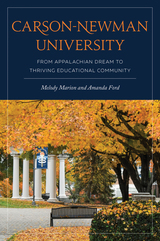
In this expertly told history, Melody Marion and Amanda Ford trace the school’s humble beginnings through two dozen presidents; the turmoil of the American Civil War, Reconstruction, and two world wars; and the contemporary scandals that have plagued the Southern Baptist Convention. Carson-Newman’s history is filled with important players, both courageous and corrupt. Many such players fought tirelessly to grow the campus and maintain a level of excellence at Carson-Newman, but the university’s history is dotted with conflict concerning women’s rights, civil rights, presidents whose questionable actions created firestorms of protest and led to their exits, and modern questions related to its Baptist affiliation.
Additionally, Carson-Newman University owes much to its Appalachian heritage, and in an excellent final chapter the authors unpack Carson-Newman’s regional identity past and present. Education in Appalachia historically has fallen behind national standards, but from its start as a seminary through its gender-segregated college days to the integrated orange-and-blue Eagles we know today, the university, with its presidents and academic body has been an agent of demonstrable gain for its students and the region. Today, as new chapters in Carson-Newman’s history are being opened, this text will serve as a record of tradition, world-class education, and lifelong learning within a Christian setting.
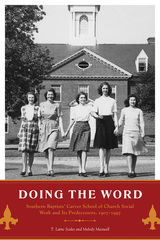
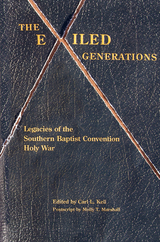
Until now, the stories of this “lost generation” have never been fully told. In this collection, Professor Kell presents a diverse and wide range of voices. Some are well-known Baptist leaders, while others are ordinary people caught up in the remarkable changes in Baptist life over the past few decades. Here, they recount their feelings of loss as they were severed from youth fellowships and removed from church rolls. Many describe the lingering emotional effects of the heartbreaking conflict that dominated their childhood and adolescence. Their recollections reveal the full range of responses—anger, sadness, pathos, humor, intense inner reflection—to these enormous shifts. This volume shows the extent to which this group has struggled and wandered in emotional and religious exile.
The Exiled Generations comprises rich primary sources for scholars and students who are exploring the profound strife that has rocked the Southern Baptist Convention. These deeply moving accounts will offer invaluable assistance to researchers analyzing the impact of the seismic changes within the denomination over the past thirty-five years.
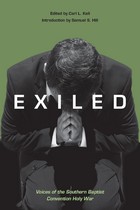
tactics to gain top positions and then used their power to purge Baptist seminary presidents and professors, church pastors, lay leaders, and women from positions of responsibility. America's largest Christian, non-Catholic denomination is firmly locked in a “holy war” to secure its churches and membership for a never-ending struggle against a liberal culture.
Exiled: Voices of the Southern Baptist Convention Holy War is a compilation of first-person narratives by conservative and moderate ministers and lay leaders who were stripped of their positions and essentially became pariahs in the churches to which they had devoted their lives.
While other books have described the takeover in historical, political, and theological terms, Exiled is different. Individual people tell their personal stories, revealing the struggle and heartache that resulted from being vilified, dispossessed, and exiled. Kell includes a variety of perspectives-from lay preachers and church members to prominent former SBC leaders such as James Dunn and Carolyn Crumpler.
The emotion captured on the pages-sadness, shock, disbelief, resignation,
and anger-will make Exiled moving even to readers who know little about the Southern Baptist movement. Exiled will also be of particular interest to historians, sociologists, philosophers of religion, and rhetorical historians.
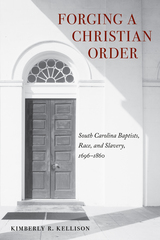
this model evolved from a Christian practice of slavery to one that expounded on slavery as morally right.
Elites who began the Baptist church in late-1600s Charleston closely valued hierarchy. It is not surprising, then, that from its formation the church advanced a Christian model of slavery. The American Revolution spurred the associational growth of the denomination, reinforcing the rigid order of the authoritative master and subservient enslaved person, given that the theme of liberty for all threatened slaveholders’ way of life. In lowcountry South Carolina in the 1790s, where a White minority population lived in constant anxiety over control of the bodies of enslaved men and women, news of revolt in St. Domingue (Haiti) led to heightened fears of Black violence. Fearful of being associated with antislavery evangelicals and, in turn, of being labeled as an enemy of the planter and urban elite, White ministers orchestrated a major transformation in the Baptist construction of paternalism.
Forging a Christian Order provides a comprehensive examination of the Baptist movement in South Carolina from its founding to the eve of the Civil War and reveals that the growth of the Baptist church in South Carolina paralleled the growth and institutionalization of the American system of slavery—accommodating rather than challenging the prevailing social order of the economically stratified Lowcountry.
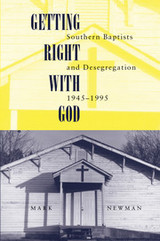
This groundbreaking study finds Southern Baptists more diverse in their attitudes toward segregation than previously assumed
Focusing on the eleven states of the old Confederacy, Getting Right with God examines the evolution of Southern Baptists’ attitudes toward African Americans during a tumultuous period of change in the United States. Mark Newman not only offers an in-depth analysis of Baptist institutions from the Southern Baptist Convention (SBC) and state conventions to colleges and churches but also probes beyond these by examining the response of pastors and lay people to changing race relations.The SBC long held that legal segregation was in line with biblical teachings, but after the Supreme Court's 1954 Brown vs. Board of Education decision in favor of desegregating public institutions, some Southern Baptists found an inconsistency in their basic beliefs. Newman identifies three major blocs of Baptist opinion about race relations: a hard-line segregationist minority that believed God had ordained slavery in the Bible; a more moderate majority that accepted the prevailing social order of racial segregation; and a progressive group of lay people, pastors, and denominational leaders who criticized and ultimately rejected discrimination as contrary to biblical teachings.
According to Newman, the efforts of the progressives to appeal to Baptists’ primary commitments and the demise of de jure segregation caused many moderate and then hard-line segregationists to gradually relinquish their views, leading to the 1995 apology by the SBC for its complicity in slavery and racism. Comparing Southern Baptists with other major white denominations, Newman concludes that lay Baptists differed little from other white southerners in their response to segregation.
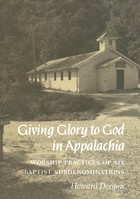
As Dorgan states in the introduction, he is less concerned with academic theorizing and more concerned with presenting a vivid, first-hand account of all that he has seen and heard. And in the nearly fifteen years he spent researching his book, Dorgan saw quite a lot: spirited, vociferous sermons, creek baptisms, foot washings, home comings, dinners on the ground, and evangelistic radio broadcasts. Dorgan's prose is at its most enchaining when he presents tableaus of these phenomena: a foot washing precipitates the erasure of interpersonal turmoil between two women; a preacher uses his lively mode of sermonic delivery to orchestrate the rapturous shouts and "hollers" of a group of women; a radio evangelist exhorts a recent widower to except salvation. The wonderful pictures interspersed throughout the book and the transcription of sermons help to further reify the worship scenes that Dorgan describes.
At times, Dorgan's prose is intensely personal. Dorgan is always aware that he is writing about sets of shared values and worship practices that mean a great deal to the congregations he is studying, and Dorgan treats his subjects and their beliefs with tremendous sensitivity and respect. Ultimately, Dorgan is writing about people and the ways in which they invest their lives with meaning and purpose. This gives Giving Glory to God in Appalachia a universal appeal: even readers who find the religious settings in the book completely alien will be able to sympathize with the congregations' search for meaning.
To sum up: Dorgan has written a beautiful, enthralling book. Don't think--just buy. And while you're at it, you might want to consider Airwaves Of Zion: Radio Religion In Appalachia
(ISBN-10: 0870497979), also by Dorgan.
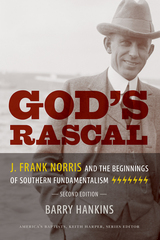
Loathed by mainstream Southern Baptists, J. Frank Norris (1877–1952) was in many ways the Southern Baptist Convention’s first fundamentalist. Twenty-five years after its first publication, this second edition of Barry Hankins’s field-defining work God’s Rascal: J. Frank Norris and the Beginnings of Southern Fundamentalism engages new scholar- ship on American fundamentalism to reassess one of the most controversial figures in the history of American Christianity. In this completely revised edition, Hankins pens an entirely new chapter on J. Frank Norris’s murder trial, examines newly uncovered details regarding his recurrent sexual improprieties, and reconsiders his views on race in order to place J. Frank Norris, a man both despicable and captivating, among the most significant Southern fundamentalists of the twentieth century.
Norris merged a southern populist tradition with militant fundamentalism, carving out a distinctly take-no-prisoners political niche within the Baptist church that often offended his allies as much as his enemies. Indeed, Norris was about as bad as a fundamentalist could be. He resided in a world of swirling conspiracies of leftists who, he argued, intended to subvert both evangelical religion and American culture. There are times when Norris’s ego looms so large in his story that he seemed less interested in the threat these alleged conspiracies posed than in their power to keep him in the limelight. Finally, his tactics foreshadowed those employed in the fundamentalists’ tenacious takeover of the Southern Baptist Convention that would occur more than twenty years after Norris’s death.

In the Name of the Father: The Rhetoric of the New Southern Baptist Conventionbegins with an analysis of the 1979 Southern Baptist Convention, the watershed convention where moderate forces fell before the powerful oratory of the ultraconservative faction, which has remained in power ever since. Communication professors Carl L. Kell and L. Raymond Camp investigate the rhetorical shift from moderate to ultraconservative in the Southern Baptist Convention, the largest denomination in the South and the largest Protestant denomination in the United States.
Drawing on sermons delivered at national conventions from 1979 to the present, Kell and Camp outline the discourses of fundamentalism, inerrancy, and exclusion. These discourses, the authors assert, point to the SBC leaders’ call for a return to times before feminism and tolerance of varying sexual orientations allegedly brought chaos to society and shook believers from their theological foundations.
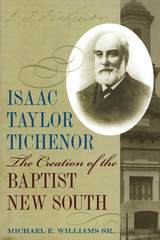
The influential role Tichenor played in shaping both the Baptist denomination and southern culture
Isaac Taylor Tichenor worked as a Confederate chaplain, a mining executive, and as president of the Agricultural and Mechanical College of Alabama (now Auburn University). He also served as corresponding secretary for the Home Mission Board of the Southern Baptist Convention in Atlanta from 1882 until 1899. In these capacities Tichenor developed the New South ideas that were incorporated into every aspect of his work and ultimately influenced many areas of southern life, including business, education, religion, and culture.
In Isaac Taylor Tichenor: The Creation of the Baptist New South, Michael E. Williams Sr. provides a comprehensive analysis of Tichenor’s life, examining the overall impact of his life and work. This volume also documents the methodologies Tichenor used to rally Southern Baptist support around its struggling Home Mission Board, which defined the makeup of the Southern Baptist Convention and defended the territory of the convention.
Tichenor was highly influential in forming a uniquely southern mindset prior to and at the turn of the century. Williams contends that Tichenor’s role in shaping Southern Baptists as they became the largest denomination in the South was crucial in determining their identity both the identities of the region and the SBC.
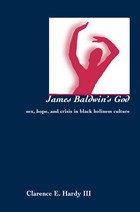
The Author: Clarence Hardy is an assistant professor of religion at Dartmouth College. His articles have appeared in the Journal of Religion and Christianity and Crisis.
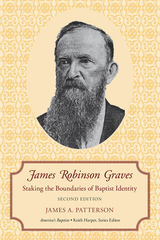
James A. Patterson’s groundbreaking study of the life and mind of James Robinson Graves explores the history of Landmarkism in the nineteenth century. Under this doctrine, Graves proposed that “true” Baptists should be able to trace their lineage directly to the early church, rather than through the strands of Protestantism. Controversial in its day, and often poorly understood now, Landmarkism, in Patterson’s nuanced interpretation, is important for understanding an essential feature of Baptist life to the present day: how do Baptists stake out their identities in reference to other Baptists and to members of competing denominations? While Graves has been widely dismissed by recent historians, in Patterson’s skillful revision, this figure draws much nearer to central concerns of Baptist thinking since the First Great Awakening.
This addition to the America’s Baptists series blends biographical insight with a thematic approach that focuses primarily on Graves’s controversial beliefs about ecclesiology, Baptist history, and eschatology. Patterson divides this work into seven chapters that progress chronologically, and this updated edition includes an expanded discussion of Christian republicanism, elaborates on the question of Graves and race, and features a longer epilogue to account for recent scholarship on Graves and Landmarkism.
James Robinson Graves is an accessible introduction to the significant albeit disputed role that the Landmark tradition played in the shaping of Southern Baptist life and thought. Seminary students and scholars of nineteenth-century Southern Baptist history will find a rich new interpretation of this misunderstood figure.
JAMES A. PATTERSON holds a PhD in American church history from Princeton Theological Seminary. He is emeritus university professor of theological studies at Union University. He is the author of Shining Lights: A History of the Council for Christian Colleges & Universities and To All the World: A History of Mid-America Baptist Theological Seminary, 1972–1997.
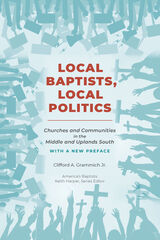
This provocative book explores the political views and actions of religious adherents who claim to base their faith on a literal interpretation of the Bible. Focusing on several small Baptist sects scattered throughout the middle and uplands South, Clifford Grammich finds that these groups are often highly engaged politically at the local level. He thus challenges the traditional view of these Baptists as politically aloof, concerned only with matters of faith and personal conduct.
Grammich shows that the politics arising from these groups’ religious beliefs are not those of any consistent, pervasive ideology. Rather, he argues, such politics more often reflect a series of adaptations to local circumstances. Among the sects that he studies, there is a strong emphasis on the local authority to interpet the Bible and, thus, to shape religious commands to very specific conditions. Beyond the broad concerns of preserving the traditional family and curbing excessive worldliness, these Baptists are free to adapt their theology to meet their particular needs—and can often do so more readily than those belonging to more hierarchical churches. Since these people are typically more rural, more southern, less educated, and less affluent than most Americans, the author notes, they can face special problems in dealing with modernity—problems that their religion helps them address.
The book includes two case studies that show in depth both the possiblities and limitations of politics within these groups. In a local labor struggle in Tennessee, Baptist sectarians were able to generate more religious support for a United Mine Workers local than was offered by the usual supporters of organized labor in other churches. On the other hand, in an environmental conflict in Kentucky, these Baptists’ traditional community concerns inhibited their participation in a broader reform movement.
Relating the beliefs and actions of the “local Baptists” to various larger themes—including those of cultural traditionalism, economic populism, and increasing affluence—Grammich offers a valuable study of the complex ways in which religious faith can affect political involvement. His book will effect a new understanding of American fundamentalism itself.
The Author: Clifford A. Grammich Jr. is director of research at Heartland Center, a social research institute in Hammond, Indiana.
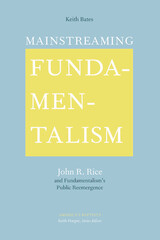
In Mainstreaming Fundamentalism: John R. Rice and Fundamentalism’s Public Reemergence, Keith Bates embarks on a thematic and chronological exploration of twentieth-century Baptist fundamentalism in postwar America, sharing the story of a man whose career intersected with many other leading fundamentalists of the twentieth century, such as J. Frank Norris, Bob Jones Sr., Bob Jones Jr., and Jerry Falwell.
Unique among histories of American fundamentalism, this book explores the theme of Southern fundamentalism’s reemergence through a biographical lens. John R. Rice’s mission to inspire a broad cultural activism within fundamentalism—particularly by opposing those who fostered an isolationist climate—would give direction and impetus to the movement for the rest of the twentieth century. To support this claim, Bates presents chapters on Rice’s background and education, personal and ecclesiastical separatism, and fundamentalism and political action, tracing his rise to leadership during a critical phase of fundamentalism’s development until his death in 1980.
Bates draws heavily upon primary source texts that include writings from Rice’s fundamentalist contemporaries, his own The Sword of the Lord articles, and his private papers—particularly correspondence with many nationally known preachers, local pastors, and laypeople over more than fifty years of Rice’s ministry. The incorporation of these writings, combined with Bates’s own conversations with Rice’s family, facilitate a deeply detailed, engaging examination that fills a significant gap in fundamentalist history studies.
Mainstreaming Fundamentalism: John R. Rice and Fundamentalism’s Public Reemergence provides a nuanced and insightful study that will serve as a helpful resource to scholars and students of postwar American fundamentalism, Southern fundamentalism, and Rice’s contemporaries.
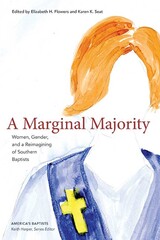
In step with the #MeToo movement and third wave feminism, women’s roles provoke lively debate in today’s evangelical sphere. The Southern Baptist Convention (SBC) has a complicated past regarding this issue, and determining what exactly women’s roles in home, church, and society should be, or even what these roles should be called, has been a contentious subject. In A Marginal Majority: Women, Gender, and a Reimagining of Southern Baptists, editors Elizabeth H. Flowers and Karen K. Seat and eight other contributors examine the SBC’s complex history regarding women and how that history reshapes our understanding of the denomination and its contemporary debates.
This comprehensive volume starts with women as SBC fundraisers, moves to the ways they served Southern Baptist missions, and considers their struggles to find a place at Southern Baptist seminaries as well as their launching of “teaching” or “women’s” ministries. Along the way, it introduces new personalities, offers fresh considerations of familiar figures, and examines the power dynamics of race and class in a denomination that dominated the South and grew into a national behemoth.
Additionally, the essay collection provides insights into why the SBC has often politically aligned with the right. Not only did the denomination become increasingly oriented toward authoritarianism as it clamped down on evangelical feminism, but, as several contributors reveal, even as Southern Baptist women sought agency, they often took it from others. Read together, the chapters strike a somber tone, challenging any triumphal historiography of the past.
By providing a history of contentious issues from the nineteenth century to the present day, A Marginal Majority provides invaluable context for the recurrent struggles women have faced within the United States’ largest Protestant denomination. Moreover, it points to new directions in the study of American denominational life and culture.
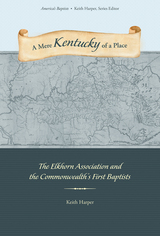
As the story goes, an itinerant preacher once visited the Bluegrass region and proclaimed heaven to be “a mere Kentucky of a place.” The Commonwealth’s first Baptists certainly thought so as they began settling the region a decade before statehood. By 1785 a group of pioneering preachers formed the Elkhorn Association, widely regarded as the oldest Baptist association west of the Alleghenies. Often portrayed in the historiography as the vanguard of a new frontier democracy, the Elkhorn Association, on closer inspection, reveals itself to be far more complex. In A Mere Kentucky of a Place, Keith Harper argues that the association’s Baptist ministers were neither full-fledged frontier egalitarians nor radical religionists but simply a people in transition. These ministers formed their identities in the crucible of the early national period, challenged by competing impulses, including their religious convictions, Jeffersonian Republicanism, and a rigid honor code—with mixed results.
With a keen eye for human interest, Harper brings familiar historical figures such as John Gano and Elijah Craig to life as he analyzes leadership in the Elkhorn Association during the early republic. Mining the wealth of documents left by the association, Harper details the self-aware struggle of these leaders to achieve economic wealth, status, and full social and cultural acceptance, demonstrating that the Elkhorn Association holds a unique place in the story of Baptists in the “New Eden” of Kentucky.
Ideal for course adoption in religious studies and students of Kentucky history, this readable work is sure to become a standard source on the history of religion on the Kentucky frontier.
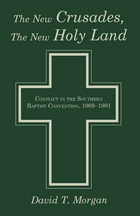
Examines the conflict between modern-day Southern Baptists and “liberal” Southern Baptists over control of the Southern Baptist Convention
David Morgan captures the essence of the conflict between some modern-day Southern Baptists, who saw themselves as crusaders for truth, as they sought to redeem a new holy land--the Southern Baptist Convention-- from the control of other Southern Baptists they viewed as "liberals." To the so-called liberals, the crusaders were "fundamentalists" on a mission, not to reclaim the SBC in the name of theological truth but to gain control and redirect its activities according to their narrow political, social, and theological perspectives. The New Crusades provides a comprehensive history of the conflict, taking the reader through the bitter and divisive struggles of the late 1980s, that culminated in the 1991 emergence of a moderate faction within the SBC. The fundamentalists had won.
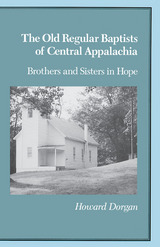
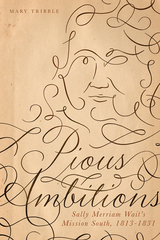
In 1812 at the age of nineteen, Sally Merriam Wait experienced her conversion. For those raised in an evangelical church during the religious fervor of the Second Great Awakening, conversion represented a key moment in a young person’s life, marking the transition from childhood and frivolity to the duties of a pious life. Sally’s conversion also marked the beginning of her journal.
Wait grew up in a New England swept with revival. Her letters reveal a northernborn woman with anti-slavery leanings engaging with an unfamiliar environment in the slave-holding South; she comes to embrace the principles of a market economy in Jacksonian America, while attending to her developing religious faith. Her decisions are shaped by a surging evangelical movement, changes in the American economy, the rise of women’s social agency, a fracturing of political traditions, and the moral conflicts inherent in a slave economy. At its simplest, Sally’s life is the tale of a nineteenth-century woman endeavoring to make her mark on the world while striving to develop her faith.
Pious Ambitions establishes Sally Merriam Wait as a significant figure in North Carolina and Baptist history. Her ambition led her from young convert to devoted wife of Reverend Samuel Wait, the first president and founder of Wake Forest University. Her journal was passed down carefully from generation to generation until it found its way in 1993 to the Special Collections and Archives at Z. Smith Reynolds Library at Wake Forest University in Winston-Salem, North Carolina, along with a large cache of letters and other documents. In examining this trove and reconstructing the life of Wait, Mary Tribble provides a rare glimpse into the spiritual education of a young woman who nevertheless successfully navigated the rise of capitalism in the market economy of the early nineteenth century.
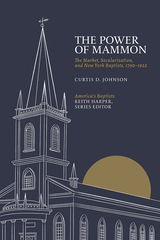
In The Power of Mammon, Curtis D. Johnson describes how the market economy and market-related forces, such as the media, politics, individualism, and consumerism, radically changed the nature of Baptist congregational life in New York State during three centuries. Collectively, these forces emphasized the importance of material wealth over everything else, and these values penetrated the thinking of Baptist ministers and laypeople alike. Beginning in the 1820s, the pastorate turned into a profession, the laity’s influence diminished, closeknit religious fellowships evolved into voluntary associations, and evangelism became far less effective. Men, being the most engaged in the market, secularized the more quickly and became less involved in church affairs. By the 1870s, male disengagement opened the door to increased female participation in church governance. While scientific advances and religious pluralism also played a role, the market and its related distractions were the primary forces behind the secularization of Baptist life.
The Power of Mammon is history from the ground up. Unlike many denominational histories, this book emphasizes congregational life and the importance of the laity. This focus allows the reader to hear the voices of ordinary Baptists who argued over a host of issues. Johnson deftly connects large social trends with exhaustive attention to archival material, including numerous well-chosen records preserved by forty-two New York churches. These records include details related to membership, discipline, finance, and institutional history. Utilizing statistical analysis to achieve even greater clarity, Johnson effectively bridges the gap between the particularity of church records and the broader history of New York’s Baptist churches.
Johnson’s narrative of Baptist history in New York will serve as a model for other regional studies and adds to our understanding of secularization and its impact on American religion.
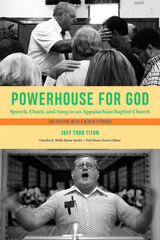
In this second edition of Powerhouse for God, Titon revisits The Fellowship Independent Baptist Church nearly four decades later. Brother John Sherfey, the charismatic preacher steeped in Appalachian tradition has passed away and left his congregation to his son, Donnie, to lead. While Appalachian Virginia has changed markedly over the decades, the town of Stanley and the Fellowship Church have not. Titon relates this rarity in his new Afterword: a church founded on Biblical literalism and untouched by modern progressivism in an area of Appalachia that has seen an evolution in population, industry, and immigration.
Titon’s unforgettable study of folklife, musicology, and Appalachian religion is available for a new generation of scholars to build upon.
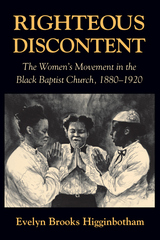
What Du Bois noted has gone largely unstudied until now. In this book, Evelyn Brooks Higginbotham gives us our first full account of the crucial role of black women in making the church a powerful institution for social and political change in the black community. Between 1880 and 1920, the black church served as the most effective vehicle by which men and women alike, pushed down by racism and poverty, regrouped and rallied against emotional and physical defeat. Focusing on the National Baptist Convention, the largest religious movement among black Americans, Higginbotham shows us how women were largely responsible for making the church a force for self-help in the black community. In her account, we see how the efforts of women enabled the church to build schools, provide food and clothing to the poor, and offer a host of social welfare services. And we observe the challenges of black women to patriarchal theology. Class, race, and gender dynamics continually interact in Higginbotham’s nuanced history. She depicts the cooperation, tension, and negotiation that characterized the relationship between men and women church leaders as well as the interaction of southern black and northern white women’s groups.
Higginbotham’s history is at once tough-minded and engaging. It portrays the lives of individuals within this movement as lucidly as it delineates feminist thinking and racial politics. She addresses the role of black Baptist women in contesting racism and sexism through a “politics of respectability” and in demanding civil rights, voting rights, equal employment, and educational opportunities.
Righteous Discontent finally assigns women their rightful place in the story of political and social activism in the black church. It is central to an understanding of African American social and cultural life and a critical chapter in the history of religion in America.
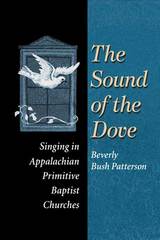
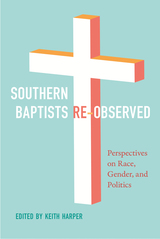
The sweeping success of the conservative takeover—based on enforcing doctrinal fidelity, especially on issues like biblical inerrancy and so-called complementarianism, a rejection of modern, secular values, and advanced international missionary work—veiled a weakness at its very heart. By the turn of the twenty-first century, the conservative resurgence failed to attract new members and, even worse, the younger generation who had grown up in the SBC were fleeing the denomination—nearly half of them are leaving the church as adults and never coming back. The contributors to this volume all offer insights into the question of why. While conservatives dominate the SBC’s governance, they have failed to resolve issues that preoccupy its members and the larger society, including those related to gender, homosexuality, race, and abuse.
The essays are grouped under four broad categories: Truth and Freedom: Baptist Institutions and Contentious Issues; Defining and Defending Biblical Truth: Staking the Boundaries; Apologies, Reconciliation, and Continuing Reality; and the View from Outside. With an introduction by editor Keith Harper contextualizing the history of the movement and the issues it faces today, this collection is sure to add new insight into this influential denomination.

Baptist leaders like Isaac Backus, Noah Alden, Samuel Stillman, John Leland, Jonathan Going, and Luther Rice exploited their church-based ministerial training in public speaking, conflict resolution, and intra-denominational networking to become political organizers. With significant gains in the formation of the Warren Association (1767), the Backus-led Grievance Committee (1769), and Leland’s formative experience in the campaign to disestablish Virginia (1780s), the Baptists allied themselves with the rising Democratic-Republican Party, touching off a coalition of anti-Federalist politics and evangelical religion that, while not directly disestablishing Massachusetts, would bear significant fruit in the Religious Freedom Act of 1811.
To Contest with All the Powers of Darkness brings a unique movement into focus that had at its inception the communal values and ministry preparation practices of a loose network of New England Baptist churches. This movement drove a significant first wedge in the church-state fusion of the Early Republic and, simultaneously, left memorable lessons in successful collective action for a New England Baptist community on the verge of an institutional explosion on the western frontier.
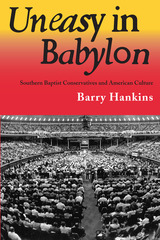
The definitive account of how conservative Southern Baptists came to dominate the nation's largest Protestant denomination
In 1979 a group of conservative members of the Southern Baptists Convention (SBC) initiated a campaign to reshape the denomination’s seminaries and organizations by installing new conservative leaders who made belief in the inerrancy of the Bible a condition of service. They succeeded. This book is a definitive account of that takeover.
Barry Hankins argues that the conservatives sought control of the SBC not or not only to secure the denomination's orthodoxy but to mobilize Southern Baptists for a war against secular culture. The best explanation of the beliefs and behavior of Southern Baptist conservatives, Hankins concludes, lies in their adoption of the culture war model of American society. Believing that "American culture has turned hostile to traditional forms of faith,” they sought to deploy the Southern Baptist Convention in a "full-scale culture war" against secularism in the United States. Hankins traces the roots of this movement to the ideas of such post-WWII northern evangelicals as Carl F. H. Henry and Francis Schaeffer. Henry and Schaeffer viewed America's secular culture as hostile to Christianity and called on evangelicals to develop a robust Christian opposition to secular culture. As the nation’s largest Protestant denomination, SBC positions on divisive cultural issues like abortion have remade the American political landscape, most notably in the reversal of Roe v. Wade.
Hankins also argues, however, that Southern Baptist conservatives sought more than orthodox adherence to Biblical inerrancy. They also sought an identity that was authentically Baptist and Southern. Hankin’s excellent and prescient work will fascinate readers interested in contemporary American religion, culture, and public policy, as well as in the American South.
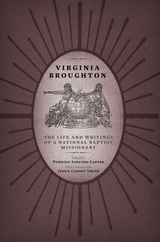
For more than half a century, Virginia E. Walker Broughton (1856–1934) worked tirelessly to uplift black communities, and especially black women, throughout Tennessee. Born into an elite African American family in Nashville, she began her professional career as a teacher and later became one of the most prominent domestic missionaries in the National Baptist Convention, U.S.A., as well as an accomplished speaker and writer. This annotated collection is the first scholarly work devoted entirely to Broughton’s life and writings.
The book for which Broughton is best known, Twenty Year’s [sic] Experience of a Missionary, was an autobiography first published in 1907 and reprinted in 1988 as part of a scholarly edition of spiritual narratives by black women. Recently, in the archives of Fisk University, Broughton’s alma mater, Tomeiko Ashford Carter discovered an earlier autobiographical work, A Brief Sketch of the Life and Labors of Mrs. V. W. Broughton, Bible Band Missionary, for Middle and West Tennessee, which was distributed at the famous Atlanta Cotton States and International Exposition of 1895. While both autobiographies portray Broughton as an important religious figure for whom missionary work became a saving grace, Life and Labors is more revealing of key facts about Broughton and her family, and it situates them more clearly among the nation’s black elite. This volume not only brings Life and Labors back into print but also collects various other pieces Broughton produced during her long career.
Among those other writings is a 1904 booklet titled Woman’s Work: As Gleaned from the Women of the Bible, and the Bible Women of Modern Times, which recognizes the prominence of the female in Christian theology and shows how Broughton anticipated the work of present-day feminist and womanist theologians. Several “training course” articles that Broughton wrote for a National Baptist newspaper, covering such topics as the Christian deportment of women and the need for black spiritual literature, are also gathered here, as are a program she devised for systematic Bible study and a brief article, published just a few years before her death, in which she describes some of her missionary field work. Complementing these primary materials are an extensive critical introduction and notes by Carter, a Walker-Broughton family tree, and a chronology of Broughton’s life.
As this collection makes clear, Virginia Broughton was strongly committed to making the work of black religious women an ongoing intellectual enterprise. In these pages, she emerges as both a dedicated missionary and a formidable religious scholar.
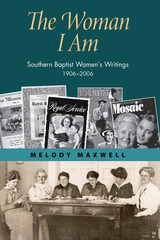
The Southern Baptist Convention (SBC) represents the largest Protestant denomination in the United States, yet Southern Baptist women’s voices have been underreported in studies of American religion and culture. In The Woman I Am, Melody Maxwell explores how female Southern Baptist writers and editors in the twentieth century depicted changing roles for women and responded to the tensions that arose as Southern Baptist women assumed leadership positions, especially in the areas of missions and denominational support.
Given access to a century of primary sources and archival documents, Maxwell writes, as did many of her subjects, in a style that deftly combines the dispassionate eye of an observer with the multidimensional grasp of a participant. She examines magazines published by Woman’s Missionary Union (WMU), an auxiliary to the SBC: Our Mission Fields (1906–1914), Royal Service (1914–1995), Contempo (1970–1995), and Missions Mosaic (1995–2006). In them, she traces how WMU writers and editors perceived, constructed, and expanded the lives of southern women.
Showing ingenuity and resiliency, these writers and editors continually, though not always consciously, reshaped their ideal of Christian womanhood to better fit the new paths open to women in American culture and Southern Baptist life. Maxwell’s work demonstrates that Southern Baptists have transformed their views on biblically sanctioned roles for women over a relatively short historical period.
How Southern Baptist women perceive women’s roles in their churches, homes, and the wider world is of central importance to readers interested in religion, society, and gender in the United States. The Woman I Am is a tour de force that makes a lasting contribution to the world’s understanding of Southern Baptists and to their understanding of themselves.
READERS
Browse our collection.
PUBLISHERS
See BiblioVault's publisher services.
STUDENT SERVICES
Files for college accessibility offices.
UChicago Accessibility Resources
home | accessibility | search | about | contact us
BiblioVault ® 2001 - 2024
The University of Chicago Press





